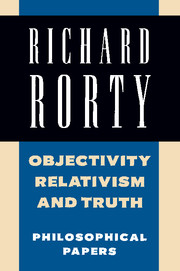Book contents
- Frontmatter
- Contents
- Acknowledgments
- Introduction: Antirepresentationalism, ethnocentrism, and liberalism
- Part I
- Part II
- PART III
- The priority of democracy to philosophy
- Postmodernist bourgeois liberalism
- On ethnocentrism: A reply to Clifford Geertz
- Cosmopolitanism without emancipation: A response to Jean-François Lyotard
- Index of names
The priority of democracy to philosophy
Published online by Cambridge University Press: 05 June 2012
- Frontmatter
- Contents
- Acknowledgments
- Introduction: Antirepresentationalism, ethnocentrism, and liberalism
- Part I
- Part II
- PART III
- The priority of democracy to philosophy
- Postmodernist bourgeois liberalism
- On ethnocentrism: A reply to Clifford Geertz
- Cosmopolitanism without emancipation: A response to Jean-François Lyotard
- Index of names
Summary
Thomas Jefferson set the tone for American liberal politics when he said “it does me no injury for my neighbor to say that there are twenty Gods or no God.” His example helped make respectable the idea that politics can be separated from beliefs about matters of ultimate importance – that shared beliefs among citizens on such matters are not essential to a democratic society. Like many other figures of the Enlightenment, Jefferson assumed that a moral faculty common to the typical theist and the typical atheist suffices for civic virtue.
Many Enlightenment intellectuals were willing to go further and say that since religious beliefs turn out to be inessential for political cohesion, they should simply be discarded as mumbo jumbo – perhaps to be replaced (as in twentieth-century totalitarian Marxist states) with some sort of explicitly secular political faith that will form the moral consciousness of the citizen. Jefferson again set the tone when he refused to go that far. He thought it enough to privatize religion, to view it as irrelevant to social order but relevant to, and possibly essential for, individual perfection. Citizens of a Jeffersonian democracy can be as religious or irreligious as they please as long as they are not “fanatical.” That is, they must abandon or modify opinions on matters of ultimate importance, the opinions that may hitherto have given sense and point to their lives, if these opinions entail public actions that cannot be justified to most of their fellow citizens.
- Type
- Chapter
- Information
- Objectivity, Relativism, and TruthPhilosophical Papers, pp. 175 - 196Publisher: Cambridge University PressPrint publication year: 1990
- 33
- Cited by

